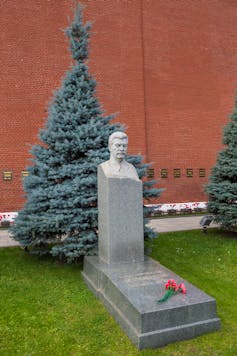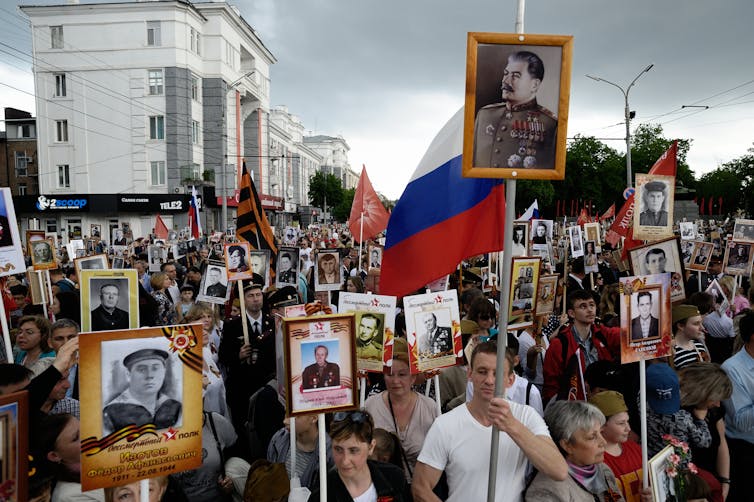Seventy years ago, on the night of March 5, 1953, a certain Joseph Vissarionovitch Djougachvili breathed his last. He was better known under his nom de guerre, Stalin, “The Man of Steel”.
An oppressed people; a reign of Terror in the name of government; real enemies, or imaginary ones, forced to confess under torture to the most absurd of crimes; mass graves; purges; deportations; famines, censorship and “total” propaganda; a war waged against Hitler for the unimaginable price of 27 million Soviet dead; a divided Europe; and a Cold War on the point of heating up: this was the inheritance left by the “Vodj” (The Leader).
Three years after his death, in February 1956, his successor Nikita Khrushchev denounced “the excesses of his personality cult” during the 20th Congress of the Communist Party. In 1961, his body was finally withdrawn from Lenin’s Mausoleum, on the Red Square, in Moscow, to be placed in more modest surroundings in the necropolis near the Kremlin wall. During the Perestroika, archives were opened and the truth on the 30 years of his reign was revealed.
But this repudiation did not last long. If polls are to be believed, Russians have become increasingly fond of him. The explanations for this are multiple. They do have a lot to do of course with the personality and the historical vision of the man who has been sitting in the Kremlin since 2000 and who views his distant predecessor both as an “effective manager” and also as the symbol of the victory of the Second World War. However, harking back to Stalin can also be inconvenient for Putin.
A relatively recent return to grace
The “Stalinist Revival”, it must be emphasised, is a more recent phenomenon than one might imagine. In 2008, at the end of Vladimir Putin’s second term, 60% of those surveyed by the Levada Center (one of the country’s main polling organisations) said that the crimes committed in Stalin’s era were unjustified. In 2012, at the end of Dmitry Medvedev’s presidential mandate, only 21% of those questioned saw Stalin as a “great leader”, which was lower than the 29% recorded in 1992, less than a year after the end of the USSR.

The dictator’s popularity took off again in 2015, the year after Crimea’s annexation. In 2019, 70% of those surveyed said that for them Stalin had played an either quite or very positive role. Only 16% saw him in a negative light. It was also from then on that young Russians, until then mostly indifferent to Stalin, started to express positive sentiments toward him. In 2021, months before the invasion of Ukraine, 56% of them considered him as a veliki vojd (a Great Leader); this was a new record.
The primary reason for these favourable sentiments towards Stalin is historical: the “leader with an iron fist” is a cliché deeply anchored in a political culture that is fundamentally conservative and has never really experienced democracy.
Furthermore, Russians have not really turned the page on Stalinism. After the death of their Leader, the country experienced two small waves of “De-Stalinisation” under Khruschev (1953-1964) and Gorbachev (1985-1991), and then significantly a long period of “Re-Stalinisation” under Brezhnev, Andropov and Chernenko (1964-1985).
The Yeltsin years (1992-1999) were marked on the one hand by “an archival revolution” that either revealed or confirmed the extent of Stalin’s crimes, and also on the other, by the absence of any real decommunization on a moral or legal level. The “trial of the Communist party” in 1992, was a failure because of a difficulty in defining the Communist party, which had never been a political party in the traditional sense, but rather was an “instrument of power control”. Russia never knew its own version of the “Nuremberg Trials” with the PCSU in the dock; this could have educated younger generations.
The nostalgia for “greatness”
The absence of a communist “Nuremberg Trial” has played an important role in the failure for Russia to become a genuine democracy.
During the second half of the 1990s, on the back of the geopolitical and economic decline of the country, we were privy to the re-emergence of discourse and policies that harked back to the long tradition of a strong Russian state: (“the power vertical”. This was a trend which was replayed and amplified during Putin’s two first terms, from 2000-2008.
Remember when in 2005, while expressing himself before the Russian Federal Assembly (the combined bicameral legislature of the Houses of Parliament), Putin called the dismantling of the USRR the “greatest geopolitical catastrophe of the 20th century”. That same Putin, during many years, kept banging on about this simple idea: it was Lenin, with his project for a federation of states, adopted in December 1922, who was retrospectively responsible for the disintegration of the USSR. The subtext was that the “catastrophe” would never have happened, had it been Stalin’s project for “autonomy”, in the ascendant at that moment.

The war over memory
Conspiracy theories form the core of Stalinophilia in Russia. Putin has frequently emphasised that even if he does not refute Stalinist crimes and the reality of the great purges of the 1930s, he is just as wary of criticisms of Stalinism, which he sees as a means to weaken Russia today, in presenting it as a country that, in the end, had not changed much from its totalitarian past. From this perspective, Putin sees attacking Stalin as participating in a Western conspiracy theory, and an attempt to downgrade Russia to a second-rank country, or even a third-rank country, in contrast to its “rightful” position.
Criticism of Stalin becomes particularly suspect when it relates to its action during the Great Patriotic War (1941-1945) . The “cult” of this war finds its roots in the Brezhnev era, when Putin was a young officer in the KGB. It’s through this cult that Stalin was rehabilitated in the eyes of millions of Russians, for whom he is closely associated with victory in 1945. The revisionist propaganda, alongside a legislative arsenal designed to fight any “falsification of history”, ended up being effective: the victor of 1945 eclipsed the tyrant of the Great Terror.
This policy of wilful amnesia has borne the results we now see. And so, in a 2005 survey, 40% of those questioned considered that the Red Army had been destroyed by the Stalinist purges compared to only 17% agreeing with this view in 2021. Even the Gulag has ended up being relegated to the status of an “unfortunate side effect”.
Can Putin “catch up and surpass” Stalin?
This being said, the “Stalinophilia” of the population nevertheless remains a double-edged sword, because it can also nourish resentment towards rulers. For Russians who express respect for Stalin, he represents in effect less of a historical character and more a symbol of a “Great Russia”, a powerful and respected country, a Russia where justice and order reign.
The decision to invade Ukraine, in February 2023, must from this perspective be seen as a manifestation of Putin’s will to “catch up and surpass” Stalin, in a parody of a famous slogan of the Soviet era. While speaking to the leaders of the counter-intelligence agency FSB on February 28, Putin asked his men to double their efforts to “eradicate the vermin who seek to divide Russians with the support of the West”.
Is a witch hunt in the league of 1937 in the works? At least the Russians won’t be able to say they weren’t forewarned. They wanted Stalinism? They will get it!
This article was translated from French by Fleur Macdonald.
Andreï Kozovoï ne travaille pas, ne conseille pas, ne possède pas de parts, ne reçoit pas de fonds d'une organisation qui pourrait tirer profit de cet article, et n'a déclaré aucune autre affiliation que son organisme de recherche.
This article was originally published on The Conversation. Read the original article.







